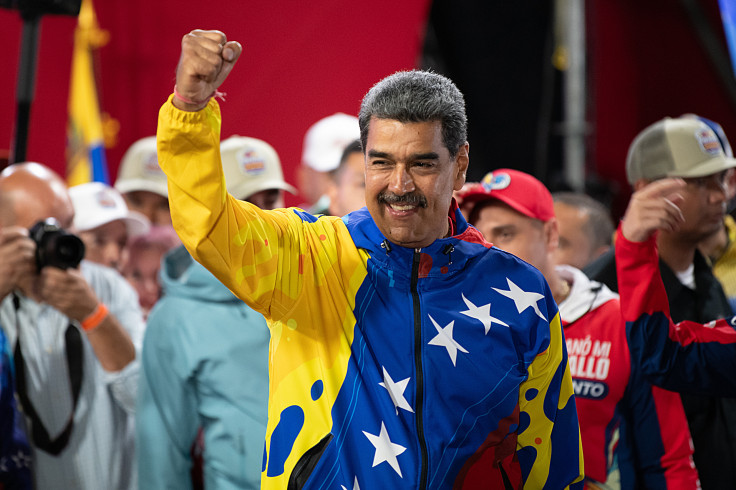
Venezuela and the U.S. have maintained a tumultuous relationship over past years, with the former imposing several sanctions on the latter over authoritarian practices. When Venezuela's Nicolas Maduro proclaimed himself as the next president of the South American country over the summer, people all over the world wondered how the U.S. would respond to such a slap to democracy. Now, as tensions escalate and the U.S. is heading into an election that has Venezuelan immigration at the heart of its issues, a new report recounts how the Trump administration tried and failed to overthrow Maduro while in office.
A recent investigation by WIRED revealed a secret Trump-era attempt to unseat Maduro from the presidency. From a CIA hack of Venezuela's military payroll system, to insider fights for spy agency resources, the report provides details at how the Trump administration internally placed Venezuela among its international priorities.
The events took place in 2019, a year after Trump and Maduro showcased their disdain for one another during a meeting at the United Nations, where the Venezuelan socialist claimed that a recent attempt on his life— two droned had exploded during an address he was giving outdoors in Caracas— had been masterminded by the U.S.
After that meeting, the Trump administration increased its efforts around the world to isolate and depose the Venezuelan leader, which included very public diplomatic showdowns. However, as it was happening, a more secret operation was taking place— a covert CIA-run to overthrow the Venezuelan leader, WIRED reports.
The operation started right after Juan Guaido declared himself the interim president of Venezuela, vowing to "reestablish the constitution," and prompting the Trump administration to announce its harshest Venezuela-related sanctions to date, targeting the country's state-owned oil company and freezing billions of dollars in Venezuelan state assets.
The CIA then assembled a Venezuela Task Force, its primary goal being an expansion of efforts to hack Venezuelan government networks and other infrastructure targets for intelligence-gathering purposes, according to former CIA officials interviewed by the outlet.
Ultimately, despite bureaucratic challenges on the way, the CIA was able to carry out a cyberattack on the state-administered payroll system used to compensate members of Venezuela's military, according to four Trump administration and former CIA officials. The efforts were designed to push teetering Venezuelan military officials to the Guaido camp, the news outlet reports.
The agency also launched an influence campaign to spread pro-democracy content online in the South American country, spun up a "democracy promotion" program to secretly sponsor leadership training, and provided support to Venezuelan civic groups, according to former US officials.
However, Trump administration officials weren't impressed by the operation.
"The average person has lost 25 pounds," a former official says. "They have no food, they have no electricity, they have no jobs, they have no medicine. And we're going to tell them about democracy?"
Some administration officials suggested U.S. special operators to conduct sabotage operations within Venezuela. But U.S. intelligence and Pentagon officials were opposed to having any American boots on the ground in the country.
But efforts to continue the operation were made more difficult when Secretary of State Mike Pompeo decided to shut down the U.S. embassy in Caracas due to increased threats of violence, making it more of a challenge to gather intelligence in Venezuela.
It all continued to fall apart quickly in April, when Guaido announced his plan to overthrow the Maduro regime on April 30, 2019, exhorting military members to defect and calling for massive street protests. The plan ultimately failed due to miscommunication and mistrust between critical players in the opposition and Maduro's equivocating supporters.
Some experts also believe that if the CIA had intervened more forcefully between January and April— when schism within the military and among other Venezuelan elites were the biggest and Guaido had the most momentum— it might have helped Maduro's ouster.
"As [former secretary of defense Donald] Rumsfeld once said, you go to war with the army you have," US national security advisor John Bolton told WIRED. "And we had a lack of capability in a number of agencies, including the intelligence community. We couldn't wait around for them to happen. So we had to do the best we could."
Eventually, when the presidency changed, so did the U.S.' priorities. In 2023, the Biden administration, worried about rising gasoline prices and a spiraling refugee crisis, brokered a deal with Maduro. By agreeing to allow free and fair presidential elections in July 2024 and accepting Venezuelan refugees deported by the U.S., the U.S. would ease some of the tough Trump-era sanctions on the nation's energy sector.
Now, months after the elections of Venezuela took place, which saw Maduro declaring victory with no proof, opposition leader and president elect Edmundo Gonzalez fleeing to Spain and opposition momentum slowly dying out, Maduro's grip on power seems secure.
© 2024 Latin Times. All rights reserved. Do not reproduce without permission.








